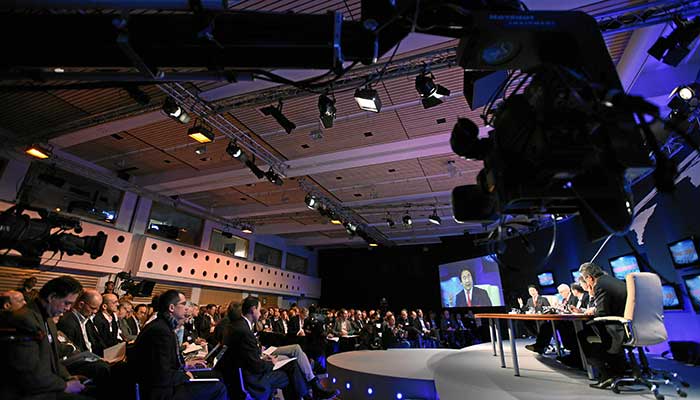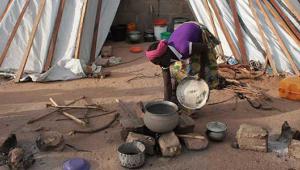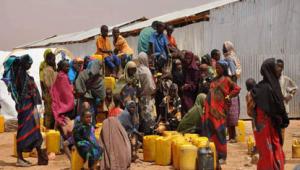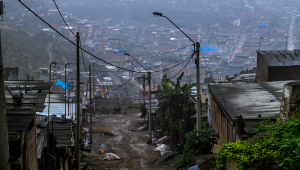web_world-economic-forum_4308085897_192a45bd60_o.jpg

An event at the World Economic Forum in Davos, Swtizerland, where the world's business and political elite descend for a week-long meeting every year.
The report, published today, was timed to coincide with the start of a week-long meeting of the world’s business and political elite in Davos, Switzerland.
The NGO said its findings evidenced that the gap between rich and poor is far greater than feared.
Oxfam has substantially revised the figure used its last report on inequality, published in 2016, which suggested that 62 people, rather than eight, owned the same wealth as the poorest half of the world’s population – around 3.6 billion people.
This is largely due to the inclusion of new data that shows the poorest half of the world’s population are worse off than previously thought, particularly in China and India.
Winnie Byanyima, executive director of Oxfam International, described the concentration of wealth in the hands of a few as “obscene”, when one in ten people survive on less than $2 per day.
Oxfam blamed growing inequality on a “broken economy” that allows big business and the super-rich to dodge taxes, drive down wages and use their power to influence politics.
It said the public anger this garners is sending shockwaves across the globe, playing a significant role in events such as the election of incoming US president Donald Trump, president Rodrigo Duterte in the Phillipines and the UK’s decision to quit the European Union.
“Across the world, people are being left behind,” said Byanyima. “Their wages are stagnating yet corporate bosses take home million-dollar bonuses; their health and education services are cut while corporations and the super-rich dodge taxes; their voices are ignored as governments sing to the tune of big business and a wealthy elite.”
Meanwhile, eight people, including Bill Gates (net worth $75bn), Microsoft founder, Amancio Ortega ($67bn), founder of the parent company of fashion chain Zara and renowned investor Warren Buffet ($60.8bn) have amassed mind-boggling fortunes. This is despite Gate’s “commendable efforts” to share his around, Oxfam noted.
The owners of Amazon, Facebook, Oracle and Bloomberg were also in the top eight, with $45.2bn, $44.6bn, $43.6bn and $40bn respectively.
The report stressed that such wealth is rarely self-made, with at least one third of the world’s billionaire wealth inherited and another 43% linked to cronyism.
It also noted that once accumulated wealth develops a “momentum of its own”, allowing its owner to seek the best investment advice, dodge taxes and otherwise achieve a rate of accumulation far higher than ordinary savers can obtain.
If billionaires continue to secure these returns, Oxfam predicted that the world could see its first trillionaire in a quarter of a century. That person would have to spend $1m every day for 2,738 years in order to use their entire fortune.
The World Economic Forum, the foundation that organises this week’s event in Davos, also said last week that rising inequality and increasing polarisation posed two of the biggest risks to the world economy.
It called for a fundamental reform of capitalism. In a separate report on inclusive growth, published today, it stressed that capitalism does not inevitably mean inequality and laid out steps to manage markets towards inclusivity.
Oxfam’s Byanyima also agreed that “governments are not helpless in the face of technological change and market forces”.
“If politicians stop obsessing with GDP, and focus on delivering for all their citizens and not just a wealthy few, a better future is possible for everyone.”
Oxfam laid out its own “blueprint for a more human economy”. This included higher taxes on wealth, greater inter-governmental cooperation, especially on issues like tax, and governmental support for business models that are not focused solely on high shareholder returns.
Mark Littlewood, director general of the Institute of Economic Affairs think-tank, condemned Oxfam’s report as a demonisation of capitalism that “conveniently” skims over the “fact that free markets have helped over 100 million people rise out of poverty in the last year alone”.
“As an anti-poverty charity, Oxfam seems to be strangely preoccupied with the rich,” he said. “For those concerned with eradicating absolute poverty completely, the focus should be on ensuring the right institutional frameworks are in place to encourage economic growth, instead of obsessing over the wealthy.”













